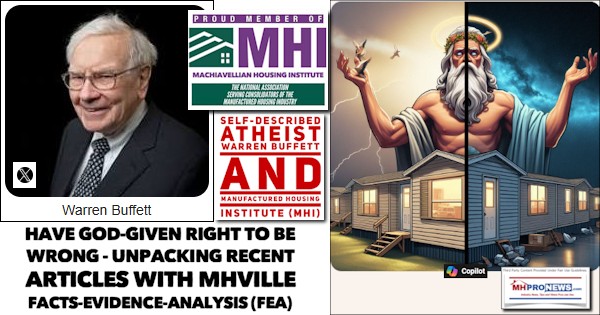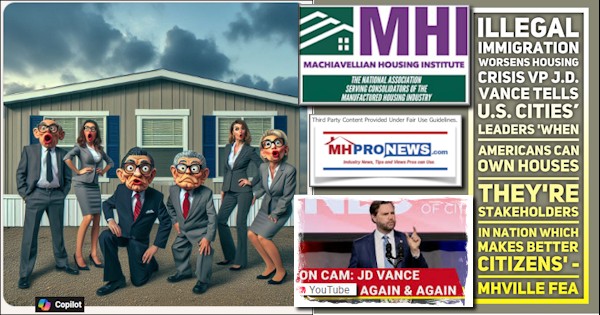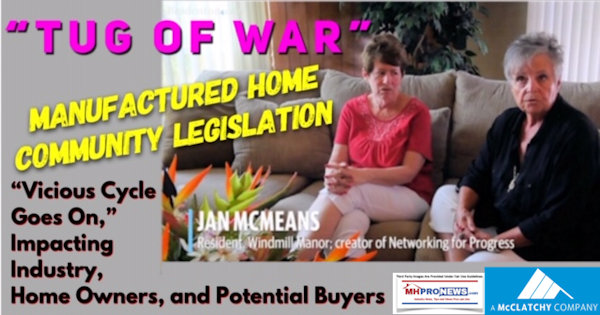
How does the manufactured housing industry, it’s current and potential home owners achieve mutual victories? That ought to be a key issue for professionals, investors, indeed all in the mix.
Here’s how a multi-year manufactured home industry leader put it.
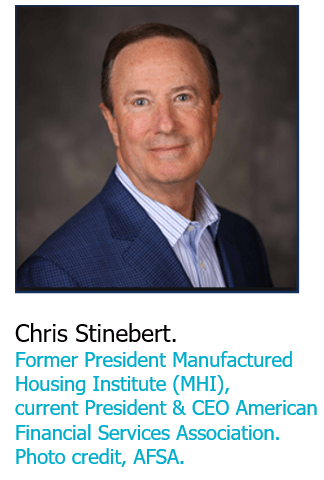
That point was made by former Manufactured Housing Institute (MHI) President Chris Stinebert. See his full commentary, linked here.
That goal of Stinebert’s ought to be at the heart of what all sides consider in a looming state legislative slug fest. The Daily Business News on MHProNews will explore the issue in depth, below. Why? Because this pending bill is a symptom of a broader problem, that based on years of trend-lines and left unaddressed will leave manufactured housing stuck in low gear.
That would harm the interests of most businesses, home owners, housing seekers, investors and others in the mix.
Here’s the genesis of how this issue was brought to MHProNews’ attention.
Mainstream Media Outreach for Background on Pending Legislation
An email came in 3.12.2019 from a reporter to MHProNews’ publisher yesterday morning. As is often the case, the journalist had a deadline – in his case – for that same day. It was a request for ‘on the record’ comment about a bill pending at the state level that would impact community owners, management companies, and mobile or manufactured home residents.
By late afternoon, that reporter’s article was already written and published.
On Google’s news function, it was the top article last night under both “manufactured home” news searches and “mobile home” news searches. That’s important, as will be revealed later.
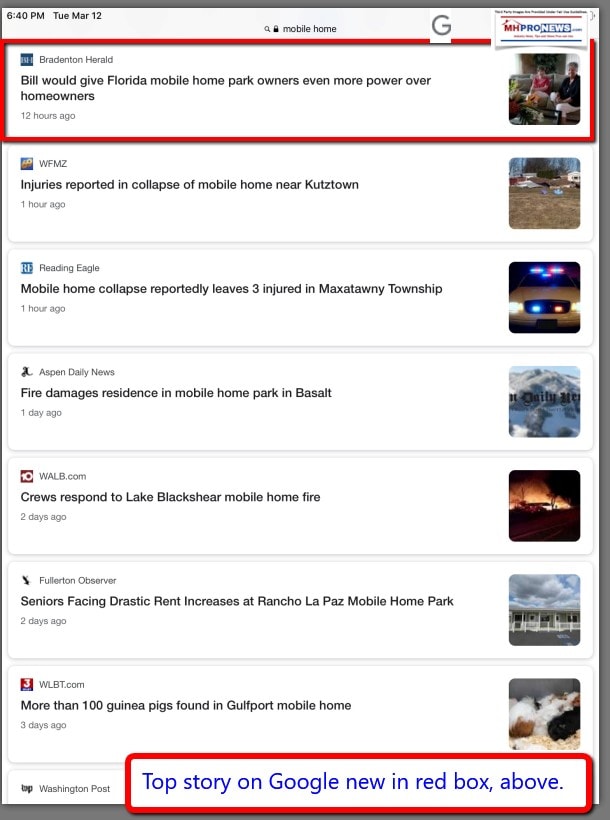
The screen captures above and below document that point.
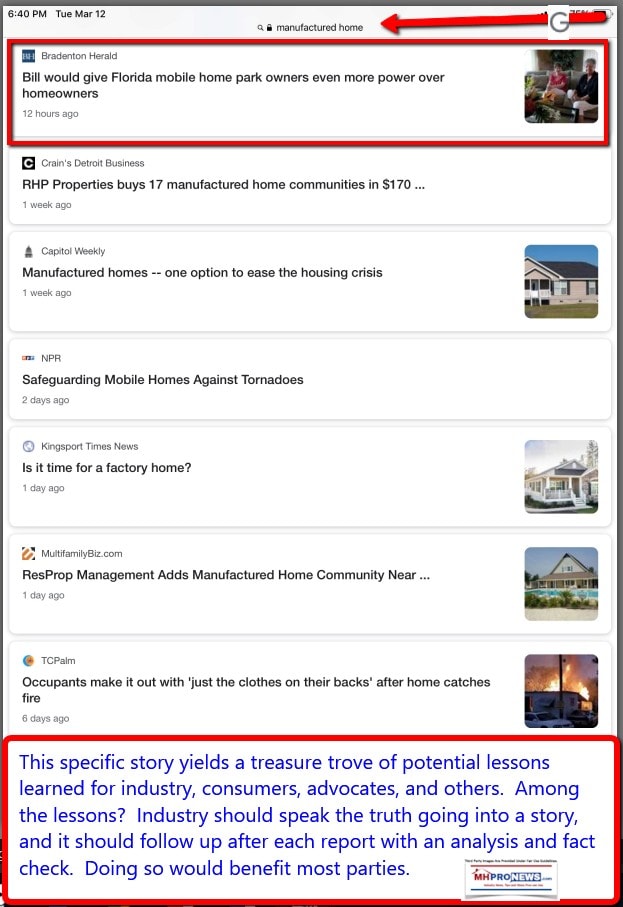
To a reporter doing his research and making his inquiry, it might have seemed like a black and white issue.
But in fact, the tension between community owners and those residents involved is arguably an artificially created problem. It is avoidable, but only if the various parties begin to understand what caused these symptoms that lead to the legislative proposals and resulting tensions in the first place. That will be covered further below.
This is therefore a useful example of lessons learned in dealing with media, public officials, or other researchers who want the truth, instead of some pre-packaged agenda driven response.
The print journalist should be commended for getting a range of perspectives, and then trying to accurately reflect them in his report. Note that headlines are often the work of an editor, not the journalist.
Here was the segue that led to the reporter’s question to MHProNews’ publisher. As is our custom here on the Daily Business News on MHProNews, direct quotes are in brown and bold text. The first and last paragraph are from the reporter, the big middle paragraph is from a third party, and it is what the reporter wanted reaction to for his report.
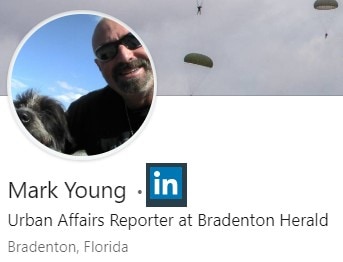
“On a different matter, I’d like your official input on another story. I received the following email today:
“Are you aware there are bills before the Florida Legislature that will have a tremendous impact on the lives on those that live in land leased mobile home parks. 723.035 will amend the law to include the responsibility for mowing, trimming trees, power washing, and painting their home, just to name a few. If, after notice from the park owner, if the violations are not corrected within the stated time, the park owner may enter the lot, perform the work and charge enough to “ensure compliance in the future”. Though we do see the need for some method of keeping up appearances of the community, it is that “ ensuring compliance “ that we object to. And can you envision the elderly trimming our live oaks and palm trees. Can you imagine being away on vacation and not receiving the notice that your home needs painting, only to return and find that it has been painted and you are receiving the bill for it. The other large issue in the bills, is mandatory binding arbitration for minor violations of Homeowners Associations. There are many land leased mobile home parks in the Manatee Sarasota area, I thought this may be of interest to them. Thank you for your time.”
Are you up to speed on this? Thoughts? Good idea, bad idea? I’m hoping to have a story on this today. I just got in so still have to research it.”
Note that the journalist didn’t reveal who spoke those words? That’s fine, but the writer did provide a direct quote, to which publisher L.A. ‘Tony’ Kovach responded as follows momentarily. The final news product had the video below, which of course was not made available to Tony until after the print journalist’s report was finished. The video was credited to another person other than the article’s reporter.
As a housekeeping note for professional reader clarity, the other items being discussed between the mainstream journalist and Tony Kovach are edited out as not germane to the issue the print reporter was focused upon for an article about pending legislation. Kovach began addressing the reporter on his requested topic as follows.
“Now, to your question. It’s not as simple as you might think.
As to the pending legislation, I’m not familiar with the specifics of the bill. The Florida Manufactured Housing Association (FMHA) could give you their feedback. That said, I am broadly familiar with the issues being mentioned, and will give you insights few if any will care to share.
At present, there is a tug of war that takes place all too often between home owner groups and some manufactured home community owners and most industry trade groups. While the issues can be significant to the residents and community owners alike, the source of tension are frankly symptoms of broader issues.
Here’s why.
More manufactured home communities are closing than are being opened. That fact has several impacts on the business marketplace, manufactured home owners, and potential customers. Using the issues you asked about as an example, here’s how that plays out in the real world.
First, it is in everyone’s interests to keep a community neat and clean. Mowing grass, trimming trees, etc. are both safety and appearance issues that protect the value of the home owners and community alike.
The question is, how is a valid goal best accomplished? Let’s look at a hypothetical case, and you’ll see why this simple question can be problematic in practice.
John and Mary Smith are getting fined for unmowed grass by an overly aggressive community owner.
Unlike an individually owned land-lease community, where the community owner may interact with their residents daily, the corporate giants are answering to investors. Those giants can ‘get away with’ steep fines or other practices in part because the resident have few if any other options.
The resident can’t move their manufactured home with ease. Manufactured homes can be moved, but it requires specialized equipment and experienced professionals to move them, that’s thousands of dollars. It’s part of the reason why once they are properly installed, manufactured homes are better thought of as immobile homes rather than ‘mobile,’ it’s costly to move.
But that cost to move would be less relevant if there were plenty of competitors in a given market that were opening up new land-lease communities. 30 or 40 years ago, these sorts of tension issues between management and residents just didn’t occur as they do now. Why? Because new communities were being built. If some resident didn’t like management company X, and that resident was in fact being mistreated by the management at X, new community owner Y may pay to have that customer’s home moved to Y’s new community.
Rephrased, normal supply and demand decades ago created options for everyone in the mix. That in turn kept all parties at a more level playing field. Management treated residents fairly, because they didn’t want to see their home moved. Makes sense?
Which bring us to a broader issue. How is possible that during an affordable housing crisis, there are so few manufactured home communities being built or expanded? Factually, manufactured homes are the most proven kind of affordable housing, period. The graphic below summarizes key data points, from 2018. The problems that were associated with the construction, safety, and energy standards of older mobile homes were largely resolved after the federal HUD Code for manufactured housing went into effect on June 15, 1976. Put differently, the issues over quality or durability of construction were resolved almost 43 years ago. Yet the stigma remains. Why?
Those federal standards for manufactured homes ought to be preemptive, especially since the passage of the Manufactured Housing Improvement Act of 2000 (MHIA), which established “enhanced preemption.”
But for a variety of reasons, some major industry trade groups won’t routinely publicly defend and promote that preemption. An arguable case in point is the Manufactured Housing Institute (MHI). State associations often follow MHI’s lead.
Here’s how that plays out with John and Mary. Let’s say that there were too few manufactured home communities being built, as is now the case. The Smith’s could, in theory, move to a privately owned site that they buy. Enhanced preemption makes that possible. By the way, the fear that NIMBY forces have of a manufactured home installed next door has been debunked by HUD research and others.
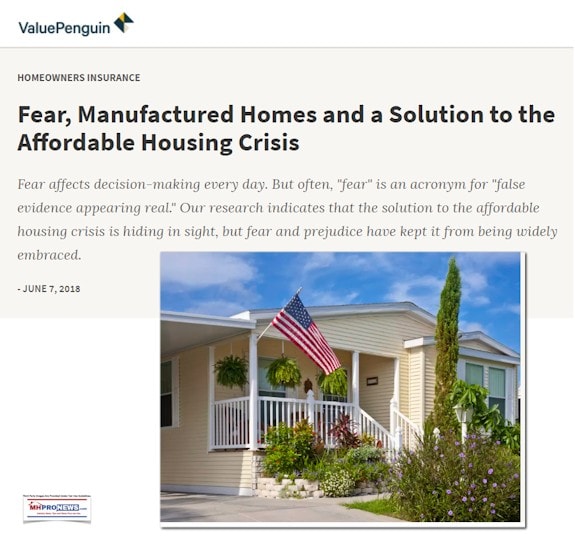
But for whatever reason, many – but not all – trade groups may posture support for enhanced preemption, but they do little in practice to support it. Some manufactured home community association leaders won’t even mention it.
By de facto failing to encourage a robust array of options for current and future community residents to turn to, the existing manufactured home communities become in some ways ‘more valuable’ real estate.
What ends up happening as a result are scenarios like this bill you are asking about. Resident groups want to nix it, because they don’t want (understandably so) a community owner to excessively fine them. Communities want the ability to do so, for both just – and potentially unjust – reasons.
The ‘solution’ that more radical resident groups like MHAction promote is that communities should all be resident owned communities (ROCs). But that brings us back to Millie Francis. She lives in a resident owned community. She is supposed to have certain safeguards. In fact, Millie told me she was fined for unmowed grass, and otherwise harassed prior to her Our Lady of Guadalupe artwork incident. Where was her protection as a shareholder in her community?
The solution to this patchwork of overlapping problems is to stop the artificial manipulation of the market. By action or inaction, big corporate interests and their trade groups can increasingly gain control over more once independently owned communities. With little effective competition, the residents become trapped. But the answer isn’t ROCs, as Millie’s case proved they can be just as overreaching as an aggressive large community owner might be.
Finally, I’m not saying that every big community is bad, nor that every small community owner is good. [So] the dynamics above may or may not fit specific cases.
To answer your final question, it isn’t a good or a bad idea. It’s entirely misplaced. They are looking at symptoms, not the cause.
The underlying causes for the tension will likely remain unaddressed by any such bill. Until market forces are allowed back in, giving home owners choices, and giving manufactured home communities a natural check on overreaching, there are going to be no quick or easy solutions. Education has to be part of that mix, because lack of understanding causes fear, frustration and can lead to bad legislation.
A case in point is rent control in the state of Delaware, where resident groups wanted that measure passed to prevent abuses by big operators. The resident groups in fact got a bill passed. Those same resident groups, now years later, are still unhappy. The law doesn’t work as they thought it would. Meanwhile, those complex laws only push more small operators out of the business, and thus encouraged more big companies to buy out smaller ones. No new communities are being built. And the vicious cycle goes on.
Make sense, sir?
All the Best,
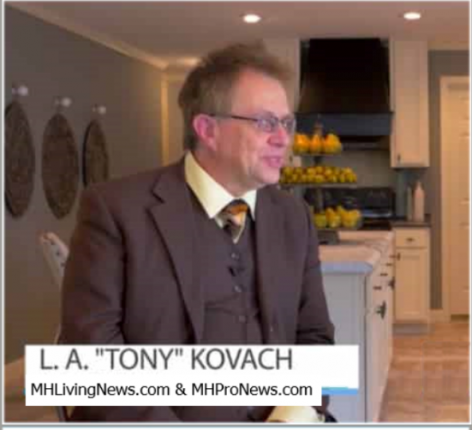 Tony
Tony
L. A. ‘Tony’ Kovach
www.MHLivingNews.com|www.MHProNews.com| Office 863-213-4090 |
The article the reporter published is linked below.
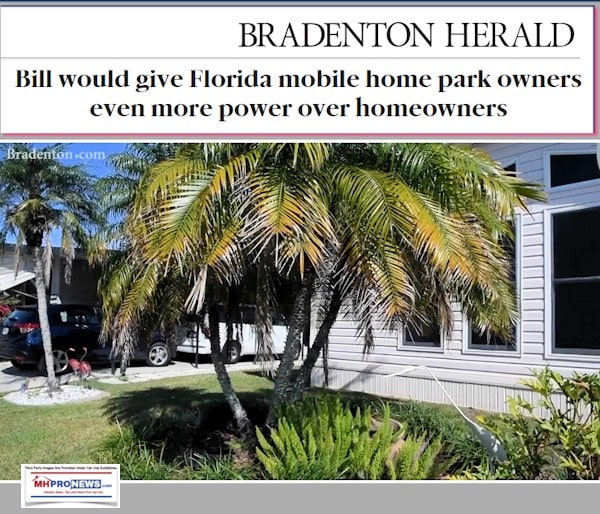
https://www.bradenton.com/news/local/article227400579.html
Why it Matters? What Does This Reveal?
First, there are voices in media across the left-right divide that want to frame stories to fit an agenda. Per third party surveys – many but not all in media tent to tilt left or Democratic, so that narrative is going to be more common. That said, there are a range of media today that likewise find audiences that cross that left-right divide. Some in media – perhaps cognizant of the charges in the last few years of ‘Fake News’ – want to get the facts correctly and accurately. The point is that a journalist merits some benefit of the doubt, unless or until they reveal themselves as a mere hack for a particular perspective.
But all of those points mean that precise phrasing is important. This report in the Bradenton newspaper – a McClatchy owned media outlet – is a case in point.
Every reporter feels compelled to cull out as much as possible to get to the heart of the matter. Good writers want to reflect the tension in a controversy that reflects ‘both sides.’
MHProNews readers can see for themselves that every quote used by the reporter was accurate. Keep in mind as you read the article linked below that the same process of culling out some details from each source the Bradenton Herald’s writer sought for comments is likely at play. No one gets every word quoted, unless the quote is a sound bite only.

Back to Stinebert, MHARR – and The Third Way for Manufactured Housing?
At present, the arguable manipulation of the marketplace by forces within and outside of manufactured housing is leading the industry and its customers into what amounts to an oppositional or confrontational posture. It is win-lose, and each side wants what it wants.
But the various parties may or may not always realize that they are dealing with symptoms rather than the core issue that Tony Kovach addressed in his commentary, quoted at length above.
That core issue is summed up in making the value proposition good for the consumer, and it is achieved by applying what the Manufactured Housing Association for Regulatory Reform (MHARR) has argued in favor of for many years. Namely, robust enforcement of enhanced preemption and a level playing field in financing. Only that combination, says MHARR, will yield robust rising production. It is achieved by ending the “Illusion of Motion” vs. seeking actual measurable results.
It is that third way – getting to the heart of the matter instead of dealing with symptoms – that manufactured housing professionals and resident leaders ought to ponder and pursue. Because the lack of options for the resident-homeowner is indeed a factor that yields the “tug of war” dynamic.
In no particular order of importance:
- Manufactured home communities, residents, and possible buyers are all being impacted by this confrontational dynamic. This kind of tug-of-war or ‘win-lose’ vantagepoint doesn’t tend to exist to this same degree in other American industries between businesses and their customers. The natural order of free enterprise ought to yield more alignment than the currently manipulated marketplace all-too-often produces. More typically, a business provides a desired service, and the customer is willing to pay, thus both routinely end up happy, because that is what keeps a business, in business. That’s healthy, while the current state of affairs is arguably harmful to each segment’s longer term interests.
- Short-term thinking and behavior may appear to benefit the businesses briefly and the same may seem to be true for the mobile or manufactured home owners. But in fact, both sides end up with mid-to-longer term issues that will at some point artificially harm the interests of each. The current low level of new home sales is in part due to a steady stream of mainstream news reports that often appear problematic to the home seeking public. A possible home buyer won’t slug through this kind of nuanced analysis, but professionals or leaders keen on sustainability and win-win growth may.
- There are no short-cuts. The multifamily housing world is growing, and that growth isn’t seen as problematic for existing apartment owners. So why is it stunted growth in manufactured home community development viewed as healthy or desirable by some in the manufactured home world? The current state-of-affairs mitigates against smaller firms in favor of larger ones. But even bigger firms know the obvious parallel between manufactured home communities and multifamily housing. So why don’t leaders of larger operations see the longer term harm this current dynamic will eventually impose upon investors and resident-owners alike? The status quo – viewed objectively – has a future Cavco Industries type threat looming over it, perhaps one that is even bigger. Or, if a strongly leftist government takes root in Washington, D.C., or at a state house, then the interest of community owners could well be harmed sufficiently. It is avoidable now, so long as long-term win-win mindsets are at work.
- Therefore, it is arguably in the long-term interests of most involved in such struggles to restore the marketplace to a more normal state affairs. That’s very much in keeping with what MHARR’s advocacy would yield. Enforce existing laws, and the market will be resorted to more normal, and eventually, robust health.
That would in turn yield what MHI’s former president Christ Stinebert called for, as previously quoted.
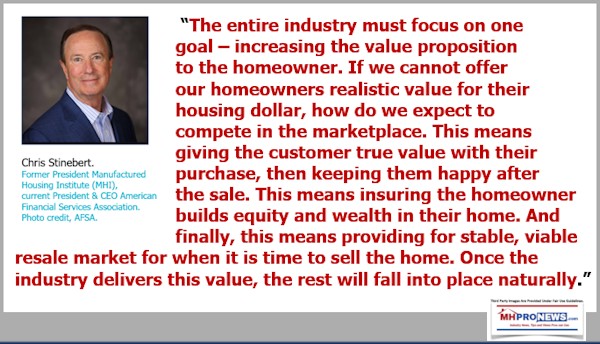
Tony Kovach took the time to lay out and link up facts that allowed for a more nuanced final news product. That should be a key part of what growth-minded associations, and businesses of all sizes seek.
The status quo is fraught with landlines. It creates winners-and-losers. That’s arguably not the norm in most industries. For longer term sustainability that leads to mutual victories, the status quo must be changed.
If current industry trade groups won’t adapt and to the best elements of the principles that MHARR and MHI’s former CEO made in his quote above, then new structures in the post-production realm must be established. Otherwise, the trend lines of more community closures than openings will yield only more woes. It remains to be seen what the new National Association for Manufactured Housing Community Owners (NAMHCO) will do about such vexing controversies.
The Last Blockbuster?
The last Blockbuster store on planet earth was recently in the news. Not so many years ago, Blockbuster was a giant, but it failed to adapt. That’s a timely warning to the manufactured housing industry. The low new home shipment levels is another warning. The time to act is ASAP, as soon as possible, preferably now.
Positive changes that yield mutual victories must be part of the mix. On that point quote above, Stinebert was arguably correct.
Which begs the question, why did it have to be Stinebert’s parting message? Was the growing influence of Omaha-Knoxville over Arlington based MHI already playing out? See the related reports below for more insights on that question. “We Provide, You Decide” © ## (News, analysis, commentary.)
NOTICE: You can get our ‘read-hot’ industry-leading emailed headline news updates, at this link here. You can join the scores who follow us on Twitter at this link. Connect on LinkedIn here.
NOTICE 2: Readers have periodically reported that they are getting a better experience when reading MHProNews on the Microsoft Edge, or Apple Safari browser than with Google’s Chrome browser. Chrome reportedly manipulates the content of a page more than the other two browsers do.
(Related Reports are further below. Third-party images and content are provided under fair use guidelines.)
1) To sign up in seconds for our MH Industry leading emailed news updates, click here.

2) To pro-vide a News Tips and/or Commentary, click the link to the left. Please note if comments are on-or-off the record, thank you.
3) Marketing, Web, Video, Consulting, Recruiting and Training Re-sources

Related Reports:
You can click on the image/text boxes to learn more about that topic.
Former Manufactured Housing Institute President, Manufactured Home Owners, Urban Institute, and You – manufacturedhomelivingnews.com
” During my time at MHI, I was often asked the same question, “What must happen for business to return – for manufactured housing to begin growing again? ” My stock answer would usually start with ‘financing’ and end with a general comment about the need to bring ‘value’ to our customers.”
Warren Buffet’s Quotable Quotes on Business, Institutions, Behavior, and News Reporting
Drilling Down on State Manufactured Housing Shipment Data, Shocking Revelations, Warning Signs
$170 Million Manufactured Home Community Acquisition by Giant RHP Properties, 17 MHCs, Now 25 States
























